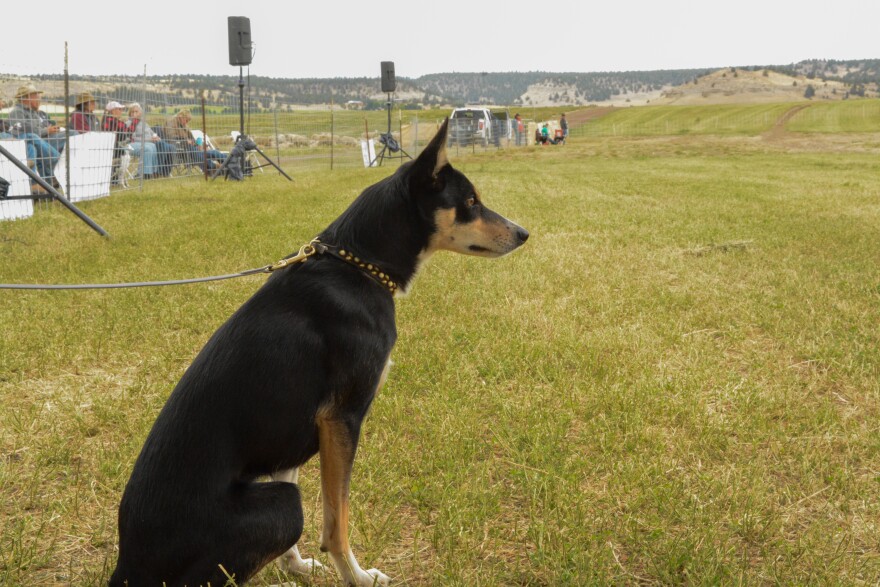Sheepdog trials don't look like most sports. Dogs round up five sheep over and over. Some herders joke that it's like watching paint dry — but it's far more engaging than that.
Robin Dean, a judge at the national sheepdog finals from Lancashire, England, said the competition recreates the kind of work the dogs would do on the farm.
“It all started over in the U.K., probably in the late 1800s," Dean said. "I would probably guess, just a couple of shepherds saying, ‘My dog’s better than yours,' and the other ones saying, ‘No, mine's better, so let's go and prove it.'"
To start the competition, the sheep are released over 500 yards away. Once the handler sets the dog free — usually a border collie — it knows exactly what to do.
“The border collie is quite a unique breed in that it works the sheep by instinct as well,” Dean said. “So they have a certain connection with the sheep that manifests itself when they get behind the sheep.”
"The border collie is quite a unique breed in that it works the sheep by instinct as well."
The dog and its trainer must drive a small herd of sheep in as straight a line as possible down the field, then show off some other skills before herding the sheep into a small pen.
Scott Glen has won the national sheepdog finals seven times. This year, he placed fourth, losing out to Alasdair MacRae and his dog, Moss. But Glen won first in the nursery competition, where dogs under three years old take part in a slightly easier version of the trial.
Glen said the trick is to get good at reading and anticipating the sheep’s behavior.
“You need a trained dog,” he said. “But you need a good dog to read their stock, and then you have to just fine-tune the reading to do the course.”
Knowing what the sheep are thinking and planning is important in these competitions. The hardy, West Coast Rambouillet sheep used in the competition can be feisty. Handler Barbara Ray said they’ve never seen a sheepdog before, so it's hard to know how they'll react.

“The sheep will change completely depending on the weather,” Ray said. “If it gets so hot, they get cranky — they don't want to move.”
Ray traveled from Virginia, where she owns a farm with sheep and cows. She got sheepdogs originally to help manage the herd, and then, like many people, fell into competitions.
“They're glad to put in overtime,” she said, sitting next to her dog Wist. “They're voted the top Employee of the Month all the time, constantly.”
Joni Tietjen from Clearmont, Wyoming, also runs a ranch where her dogs help out. She said that over the years, she has found that she prefers dogs that are easier to train and want to be team players.
“I still want talent, and I still want power and courage and all the things,” she said as her dog Ash stared up at her, his paws wrapped around her leg. “But I want the ones that really want to please me. And this one is… I'm going to be honest — he's almost to a fault that way.”
Tietjen said that one of the major benefits of having the dogs work on a ranch is that it allows them to take a mental break from the intensity of competitions while still doing what they love.
“When I'm ranching and using them for work, I kind of let them have some freedom,” she said. “And it's really good for their brain, to not be so managed like we do when we run in a competition.”
Ray and Tietjen are part of a growing minority of sheepdog owners whose dogs actually work on the farm between competitions.

This is the eighth sheepdog competition that Geri Byrne has organized.
“Most of these people have sheep to train their dogs on, not dogs for their sheep,” she said.
People don’t eat as much lamb as they used to, so there are fewer sheep farmers, Byrne said.
But that doesn’t mean there are fewer people entering sheepdog trials. If anything, there are more than ever, Byrne said.
In the past, participants needed to earn about 15 points in other sheepdog trials to compete at nationals.
“This year, I have 19 points, and I'm sitting first on the waiting list,” Byrne said. “I didn't get in with that, so it took a lot more points, which means there's a lot more people out there trialing and earning points.”
While more people getting involved is good for the sport, the growing number of hobbyists makes it harder to put on the competitions. Dean said they’re facing the same issues over in the U.K.
“Farmers have less time, and there aren't as many sheep about because of the finances and the farming situation,” he said. “So whilst there has been an increase in the popularity of the sport, it also throws up its own challenges as regards keeping it going.”
Byrne said they needed to source 800 sheep for the competition, so that every competitor in the preliminary round could herd five fresh sheep. It can be hard to find that many sheep nowadays. She’s also going to be hosting the national sheepdog finals next year.
But the sheepdog community is nothing if not determined. Tietjen said there’s something addictive about the sport.
"You can have 100 bad runs,” she said. “But you can’t lose what it feels like to have one come together like that, and that's what keeps you working in it.”




